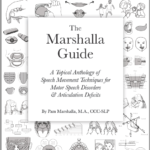Out of Range Testing for Severely Involved Students

Paula Stone,M.S.,C.C.C.-SLP wrote:
I would like to spend time discussing evaluation procedures for children who are severe to profound but chronologically are beyond the PLS 5.
Thank you for considering this important discussion.
Evaluating severely involved children who are below age ranges for test measures is extremely difficult. Being in the public schools we do run across this every so often. I can only tell you what I do. I’m not familiar with the Preschool Language Scale 5 but I do remember how the old PLS worked. I think you should be able to apply some of the information below. If there is anyone else out there who works in a setting where most of the kids are severe to profound in their development please add in your information. Especially if there are language scales out there that work well with severely language impaired children.
My experience is primarily with low functioning, low IQ kids. However, I found one past evaluation where I had to be very creative. School systems are often very limited with their variety of testing materials.
- In general, these evaluations will end up being very narrative. You will have to constantly watch the student’s behavior and manner of performance. You will have to comment on almost everything.
- You will not be able to report standard scores. If a test has age scores I will reluctantly report those. However, I will explain why standard scores can not be presented
- If the student is able to attend and point, I like to start with the Peabody Picture Vocabulary Test (PPVT) and (EVT). I actually like all my students to have a PPVT and an EVT. I think these tests combined with manner of performance gives a lot of information. Plus there is a huge age range, making it easy to compare performance from year to year or every three years.
- You can use tests like the PLS or the Test of Auditory Comprehension of Language (TACL) as checklists, describing what the kids can and cannot do. I’ve actually taken those tests and used the tasks mentioned to make a checklist to monitor performance. It isn’t ideal, might even be wrong to do this but it works and you have something to measure.
- A Language Sample works very well. You can determine Mean Length of Utterance, sentence structure, omissions, intent, topic maintenance and a whole host of other things. You’re going to have to use your tape recorder (now iphone) and transcribe the language sample then comment. Honestly this is where your clinical skills are put to the test.
- If your student is non-verbal you will have to describe how the child responds to language stimuli. If they work with a communication board try to incorporate that method.
- You may want to include an observation or how discuss how the student works in therapy.
- Evaluation might have to take place over several shorter sessions.
- Adding in some sort of pragmatic profile scale is also a good idea. With our low kids we are always teaching social skills. With younger kids the Clinical Evaluation Language Functions (CELF) probably isn’t the best choice. I am sure there are others out there.
- Every single one of these evaluations are going to look different.
This might not be the best way to evaluate severely involved kids but I work with what I have. Most school systems will just be happy that they don’t have to hire out for a speech and language evaluation. If they insist on standards explain the situation to them. They have two options hire out or buy the right testing materials. I’ve read outside evaluations on severely involved kids, from both hospitals and private vendors and I’ve yet to see an evaluation that is significantly better than what I generate. It’s challenging that’s for sure and it takes a lot more work. I’d love to hear what you have to say on the subject.
Below are two sample evaluations, hope they help out.
Teresa








One thing I struggle with in regards to this population is when to dismiss. Most of my students with multiple disabilities will always have low vocabulary and language scores. Do you have any personal guidelines you follow as to when to dismiss these students, especially as they get into middle and high school?
That’s a tough one. I think at some point you’re not going to see any more significant growth with vocabulary and basic language. How to document that is the tricky part. You might be able to document that with your 3 year testing, if you’ve (or someone else has) set up test measures that you can compare. If they are not reaching their goals or even coming close that would be more evidence. It’s difficult to present in a meeting with parents because they have to accept their child has hit a plateau. In those situations talk with your team prior to the meeting and explain your findings and the situation. People who have worked with the family will advise on what their reaction might be. Moving to a consult model for year might make for a good transition. That way you will observe for a year and still have some interactions with student and staff. You’ll know if your decision to d/c therapy was right.
What I often see happening with older students tend to get on a more functional tract in school, such as life skills. At that point my therapy usually tends to focus on more on social speech skills.
Seeing these students through out high school is not necessarily a bad thing unless your caseload is bursting. You are part of their social circle, you can model, you can stimulate and you can focus on many language skills that teachers and other staff truly have little to no awareness of. It’s hard for a therapist when you don’t see significant progress or you’re not able to build on skills. In my state, these students still have to accumulate a portfolio, any work you do with them can support that portfolio. Advice and reality for every single one of these kids is going to be different because each one is very unique.
Thanks so much for taking a look at my blog
Teresa